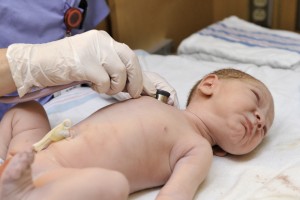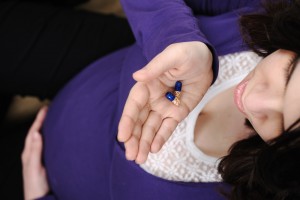
Persistent pulmonary hypertension of the newborn (PPHN) is associated with increased morbidity and mortality of infants and occurs in 10-20 per 10,000 births.
Those who survive face chronic lung disease, seizures, and neurodevelopmental problems as a result of hypoxemia and aggressive treatment (Walsh-Sukys et al 2000; Farrow et al 2005; Clark et al 2003; Glass et al 1995).
Based on a single study in 2006, the FDA issued a public health advisory that late pregnancy exposure to SSRIs may be associated with an increased risk of PPHN (FDA 2015; Chambers 2006). However, a review yielding conflicting findings led the FDA to conclude that they were premature in their conclusion.
This is the background to a new study by Huybrechts et al (2015), which sets out to investigate SRRI and non-SSRI antidepressants and the associated risk of PPHN in late stage pregnancy.

PPHN is a potentially fatal condition affecting mainly full-term babies, in which the blood flow to the lungs shuts down because the main arteries to the lungs constrict.
Methods
Cohort and data
Participants were drawn from the Medicaid Analytic eXtract (MAX) cohort, which holds the health records of medicate beneficiaries in the United States.
Antidepressants
If women filled 1 antidepressant prescription 90 days before delivery, they were considered ‘exposed.’ Antidepressant medications were classified as either SSRIs (Selective Serotonin Re-uptake Inhibitors) or non-SSRIs. Women exposed to both types of antidepressant were excluded from the analysis. A reference group of women was created, whom had not been exposed to either SSRI or non-SSRIs at any time during pregnancy.
Persistent Pulmonary Hypertension of the Newborn (PPHN)
PPHN was defined by the ICD-9 diagnostic criteria for persistent foetal circulation or primary pulmonary hypertension in the first 30 days following delivery.
Analysis
A sensitivity analysis was conducted to control for possible misclassification, with exposure status defined as filling 2 prescriptions during 90 days before delivery, and outcome redefined as only severe cases of PPHN (respiratory assistance, extracorporeal membrane oxygenation, or inhaled nitric oxide therapy).

This very large (3.8 million pregnant women) population-based study included mothers in the US on low income and with limited resources.
Results
Within 3,789,330 pregnancies, 3.4% of women used antidepressants in the 90 days before delivery, of which 2.7% were SSRIs and 0.7% were non-SSRI antidepressants.
Antidepressant versus non-use
- 31.0 (95% CI, 28.1 to 34.2) per 10,000 infants exposed to antidepressant use had PPHN
- 20.8 (95% CI, 20.4 to 21.3) per 10,000 infants not exposed to antidepressant use had PPHN
SSRI versus non-SSRI antidepressant use
- 31.5 (95% CI 28.3 to 35.2) per 10,000 infants exposed to SSRIs had PPHN
- 29.1 (95% CI 23.3 to 36.4) per 10,000 infants exposed to non-SSRIs had PPHN
Depression diagnosis
After restricting to a diagnosis of depression:
- 33.8 (95% CI, 29.7 to 38.6) per 10,000 infants exposed to SSRIs had PPHN
- 34.4 (95% CI, 26.5 to 44.7) per 10,000 infants exposed to non-SSRIs had PPHN
- 14.9 (95% CI 23.7 to 26.1) per 10,000 infants not exposed to antidepressant use had PPHN
Sensitivity analysis
- Women who filled 2 prescriptions in the 90 days before delivery did not have stronger associations
- Changing the definition for PPHN did not alter associations in either SSRIs or non-SSRIs

The chances of a baby getting PPHN when its mother was not taking an SSRI are around 2 in 1,000, compared to around 3 in 1,000 when the mother had taken an SSRI in the last 90 days of pregnancy.
Discussion
Overall, the authors found evidence that SSRI exposure in the last 90 days of pregnancy may be associated with an increased risk of PPHN. However, the magnitude of risk observed is less than has previously been reported. Furthermore, sensitivity analyses did not amplify these risks.
The authors conclude by suggesting clinicians should take the increase of risk of PPHN into consideration when prescribing these drugs during pregnancy.
Limitations
There are a few limitations in this study to be noted:
- Possible misclassification of the exposure or outcome, (e.g. filling a prescription does not guarantee it was taken as prescribed) which may bias the results. However, the authors did conduct a sensitivity analysis in order to control for this.
- The baseline characteristics varied between women taking antidepressants and those who did not, with women prescribed antidepressants more likely to be older, white, taking other psychotropic medicines, be chronically ill, be obese, smoke, and have health care issues. While the SSRI and non-SSRI groups were more comparable, non-SSRI women had higher overall illness, more comorbidities, and co-medication use. Additionally, the participant population was drawn from a relatively low-income group, in which comorbid illness is likely to be higher than general populations, which may account for the difference in risk of previous studies.

This evidence would suggest that the benefits of antidepressants taken during pregnancy outweigh the risks of rare events such as PPHN.
Professor Andrew Whitelaw, Professor of Neonatal Medicine at the University of Bristol, said of the study:
Taking this study with the previous evidence, I conclude that there is a slightly increased risk of PPHN if a pregnant woman takes an SSRI but this only brings the risk up to 3 per 1000 births. I do not suggest that seriously depressed pregnant women should be denied SSRI treatment, but it would be wise for them to deliver in a hospital with a neonatal intensive care unit in case PPHN does occur.
Links
Primary paper
Huybrechts K, Bateman B, Palmsten K, Desai R, Patorno E, Gopalakrishnan C, Levin R, Mogun H, Hernandez-Diaz S. (2015) Antidepressant Use Late in Pregnancy and Risk of Persistent Pulmonary Hypertension of the Newborn. 2015: 313(21). [Abstract]
Other references
Walsh-Sukys MC, Tyson JE, Wright LL et al. (2000) Persistent pulmonary hypertension of the newborn in the era before nitric oxide: practice variation and outcomes. Pediatrics. 2000;105(1 pt 1):14-20. [PubMed abstract]
Farrow KN, Fliman P, Steinhorn RH. (2005) The diseases treated with ECMO: focus on PPHN. Semin Perinatol. 2005;29(1):8-14. [PubMed abstract]
Clark RH, Huckaby JL, Kueser TJ et al. (2003) Clinical Inhaled Nitric Oxide Research Group. Low-dose nitric oxide therapy for persistent pulmonary hypertension: 1-year follow-up. J Perinatol. 2003;23(4):300-303. [PubMed abstract]
Glass P, Wagner AE, Papero PH et al. (1995) Neurodevelopmental status at age five years of neonates treated with extracorporeal membrane oxygenation. J Pediatr. 1995;127(3):447-457. [PubMed abstract]
US Food and Drug Administration. (2006) Public health advisory: treatment challenges of depression in pregnancy and the possibility of persistent pulmonary hypertension in newborns.
Chambers CD, Hernández-Diaz S, Van Marter LJ, et al. Selective serotonin-reuptake inhibitors and risk of persistent pulmonary hypertension of the newborn. N Engl J Med. 2006;354(6):579-587. [PubMed abstract]


Today @MegEliz_ looks at risk of persistent pulmonary hypertension of the newborn after antidepressants in pregnancy http://t.co/70ky4r2fOs
Morning @nikkinewhouse Pls check out @MegEliz_’s latest blog on antidepressants & PPHN risk when you have time http://t.co/70ky4r2fOs
@Mental_Elf @MegEliz_ Great blog, some really good messages there re perceived risks and reality :)
#Antidepressants during #pregnancy and risk of persistent pulmonary hypertension of the newborn http://t.co/MqtTy85P9s #PPHN #cohortstudy
I’ve blogged for @Mental_Elf today on the use of antidepressants during pregnancy and risk of PPHN: http://t.co/WLsc1pFJHd
@MegEliz_ @Mental_Elf great concise summary of findings. Thank you.
Risk of persistent pulmonary hypertension of the newborn remains low when mothers take antidepressants in pregnancy http://t.co/70ky4r2fOs
Do antidepressants affect the health of an unborn baby? Fascinating study @Mental_Elf http://t.co/qkxU8FXlTL #mentalhealth
RT @playlablondon: Do antidepressants affect health of an unborn baby? Fascinating study @Mental_Elf http://t.co/nXJBfUTnNN #mentalhealth
Antidepressants during pregnancy and risk of persistent pulmonary hypertension of the newborn https://t.co/y28YhvndHJ via @sharethis
Antidepressants during pregnancy and risk of persistent pulmonary hypertension of the newborn https://t.co/CuKmgCaoX3 via @sharethis
Don’t miss: Antidepressants during pregnancy and risk of persistent pulmonary hypertension of the newborn http://t.co/70ky4r2fOs #EBP
Taking antidepressants during pregnancy and the risk of persistent pulmonary hypertension of the newborn https://t.co/FLsPmywn9Q @Pandas_uk